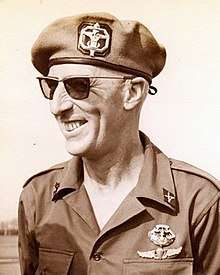Moch. Idjon Djanbi
| Mochammad Idjon Djanbi | |
|---|---|
 Mochammad Idjon Djanbi | |
| Birth name | Rokus Bernardus Visser |
| Born |
May 13, 1914 Boskoop, Netherlands |
| Died |
April 1, 1977 (aged 62) Yogyakarta, Indonesia |
| Allegiance |
|
| Service/ |
|
| Years of service | 1942 - 1969 |
| Rank |
Lieutenant (British Army) Captain (Royal Netherlands East Indies Army) Lieutenant colonel (Indonesian Army) |
| Unit |
No. 10 (Inter-Allied) Commando (1942-1945) Korps Speciale Troepen (1945-1949) Kopassus (1952-1969) |
| Commands held | Kopassus |
Mochammad Idjon Djanbi (born Rokus Bernardus Visser; May 13, 1914 – April 1, 1977) [1][2] was a British commando, Korps Speciale Troepen officer and first commander of Kopassus.
Military Career
Military Career during World War 2
Born the son of a successful Tulip farmer. After completing his study in London, Visser could not return to the Netherlands as it was under German occupation as the World War II just begun. Visser volunteerd in Dutch Legion in United Kingdom. He was then assigned as driver for Queen Wilhelmina. He resigned from that post and volunteered to be Radioman in No. 2 Dutch Troop, No. 10 (Inter-Allied) Commando. Along with other allied troops, Visser participated in his first battle in Operation Market Garden, when the unit was incorporated into 82nd Airborne Division. Two weeks later, Visser was reassigned to 101st Airborne Division and landed in Eindhoven. On November 1st, 1944, Visser was reassigned to Royal Commando and conducted amphibious assault in Walcheren.[3]
Military Career in Royal Netherlands East Indies Army
He then attended officer school prior to being sent to Asia. As an officer, Visser attended paratrooper school in India and intended to join other allied forces in Asia to fight Japan forces in Dutch East Indies. However, Japan was surrendered before Visser was sent to the Dutch East Indies. Visser was assigned to be an instructor in a Dutch special forces school in India known as School Opleiding Parachutisten /SOP (Paratrooper School). The school was later moved to Jakarta in 1946 and then moved again to Hollandia.
Visser grew to like living in the Dutch East Indies, and asked his wife (a British woman he had married during the war) and his sons and daughters to remain with him in the Dutch East Indies. When his wife refused, he opted for divorce. By the time he returned in 1947, the school had already moved to Cimahi, Bandung and Visser was promoted to Captain. During 1947 - 1949, the paratrooper school led by Captain Visser continued to educate elite paratroopers until transfer of power to Indonesia. Captain Visser then opted to stay in Indonesia as a civilian, moving to Bandung , working as a flower farmer di Pacet, Lembang, embrace Islam, marry his Sundanesse lover and change his name to be Mochammad Idjon Djanbi.[4]
Military Career in Indonesian Army
On 15 April 1952, Colonel Alexander Evert Kawilarang began to form Kesatuan Komando Tentara Territorium III/Siliwangi (Kesko TT), the early name of Kopassus and the basis for this historic special forces unit.
Not long after, Colonel Kawilarang with the use of military intelligence located and met with Visser who had remained a peaceful and law-abiding citizen in newly independent Indonesia, settled in West Java, married an Indonesian woman, and was known locally as Mochammad Idjon Djanbi. He was the first recruit for the Army special forces and given the rank of major, as well as its first commander. Due to him, the unit which later became Kopassus wear red berets instead of the distinctive green beret (color traditionally favored by airborne troops in Europe).[4]
In 1956, with increasing combat capability of special forces, Army leadership saw opportunity to place the unit under the hands of indigenous officers. Due to lack in tact, this angered Djanbi and cause him to resigned his position as commander. Later he was given position at a plantation as a result of the nationalization of a number of foreign-owned plantation.[4] Prior to his retirement in 1969, he was promoted to be lieutenant colonel at the special force anniversary.